Alan Baxter's Blog, page 79
August 21, 2011
2011 Hugo Award winners
The Oscars of the SF world, the Hugos, are awarded at Worldcon every year. They've just been announced for 2011 at Renovation in Reno, Nevada. The winners of the 2011 Hugo Awards are:
BEST NOVEL: Blackout/All Clear by Connie Willis (Ballantine Spectra)
BEST NOVELLA: The Lifecycle of Software Objects by Ted Chiang (Subterranean)
BEST NOVELETTE: "The Emperor of Mars" by Allen M. Steele (Asimov's, June 2010; also in audio)
BEST SHORT STORY: "For Want of a Nail" by Mary Robinette Kowal (Asimov's, September 2010)
BEST RELATED WORK: Chicks Dig Time Lords: A Celebration of Doctor Who by the Women Who Love It, edited by Lynne M. Thomas and Tara O'Shea (Mad Norwegian)
BEST GRAPHIC STORY: Girl Genius, Volume 10: Agatha Heterodyne and the Guardian Muse, written by Phil and Kaja Foglio; art by Phil Foglio; colors by Cheyenne Wright (Airship Entertainment)
BEST DRAMATIC PRESENTATION, LONG FORM: Inception, written and directed by Christopher Nolan (Warner)
BEST DRAMATIC PRESENTATION, SHORT FORM: Doctor Who: "The Pandorica Opens/The Big Bang", written by Steven Moffat; directed by Toby Haynes (BBC Wales)
BEST EDITOR, SHORT FORM: Sheila Williams
BEST EDITOR, LONG FORM: Lou Anders
BEST PROFESSIONAL ARTIST: Shaun Tan (Go, Aussie!)
BEST SEMIPROZINE: Clarkesworld, edited by Neil Clarke, Cheryl Morgan, Sean Wallace; podcast directed by Kate Baker
BEST FANZINE: The Drink Tank, edited by Christopher J Garcia and James Bacon
BEST FAN WRITER: Claire Brialey
BEST FAN ARTIST: Brad W. Foster
JOHN W. CAMPBELL AWARD FOR BEST NEW WRITER [Not a Hugo]: Lev Grossman
I thought there were a few givens in this year's nominations, and I was wrong on almost every count. Inception was always going to win. Huge congratulations to the winners and to all the other nominees.
.
August 19, 2011
Winds Of Change launch at Conflux
My short story, Dream Shadow, is going to be published in the new anthology from CSFG Publishing, Winds Of Change. It looks like it's shaping up to be a great anthology and it now has an official launch.
Here are the details:
Friday, September 30th, 2011 at 7pm
Conflux Science Fiction Convention
Launceston Room
Quality Hotel, Woden
That's in Canberra, of course. So if any of you are likely to be around the area, do drop in. I'll be there, along with a number of the contributing authors, and we may even do a bit of reading.
Of course, that's just the start of the whole Conflux convention, so make a journey to the nation's capital and stick around for the whole Con. It's one of my favourites and I'll be there all weekend.
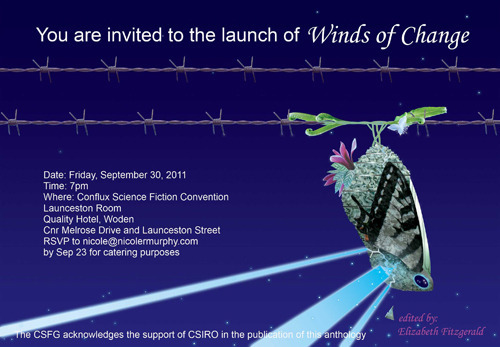
August 17, 2011
A bit of Australia and New Zealand at Worldcon
I mentioned here before about the wonderful generosity of Bob Kuhn, reading a selection of work from Australian and New Zealand authors at Worldcon in Reno. Well, it's this weekend.
There are now a few more people on the bill and it looks like being two really cool reading sessions. I'm so pleased to be included in this. Here's the schedule:
SATURDAY 10 am: Angela Slatter, Kylie Chan, Lisa Hannett, Fiona McIntosh and Mary Victoria.
SUNDAY 2 pm: Alan Baxter, Kim Falconer, Helen Lowe, Nicole Murphy and Gillian Polack.
Bob's a great voice artist, you can learn more about him here.
So if you're going to Reno for Worldcon this weekend, I'm very jealous. But while you're there, catch some great Aussie and Kiwi spec fic, read by a great Australian voice artist.
.
August 15, 2011
The August Australian Speculative Fiction Blog Carnival
Nicole Murphy has collected a fantastic array of links to keep you busy all week. The August Australian Spec Fic blog carnival is one of the biggest I've ever seen. So big it's in two parts.
Enjoy and share!
.
August 14, 2011
"The 7 Garages of Kevin Simpson" at Pseudopod
I've talked here before about how much I love short fiction podcasts. Probably my favourite podcast of all is Pseudopod, the sound of horror! So you can imagine how excited I am that Pseudopod are podcasting one of my stories. It's an original too, not a reprint, so this will be a new yarn for everyone.
This story came about due to a passing comment at a con. The small and intimate Freecon that happens every year in Sydney, to be exact. A mention was made of an old SF fan who had seven garages full of stuff, that his family new nothing about until after his death. I thought that was a great premise for a story, so I changed the names and wrote it. Of course, the fan had all kinds of junk in the garages and I've made it into a horror story, but the genesis of the idea is fact. I always like it when things like that happen.
So have a listen and see what you think. You can find the story here – http://pseudopod.org/2011/08/12/pseudopod-242-the-7-garages-of-kevin-simpson/
.
Practicing Jedi overlooked on 2011 Australian Census
Practicing Jedi have been overlooked on the Australian Census. Then again, pretty much everything has been overlooked on the latest census, but the Jedi issue is more important than you might realise.
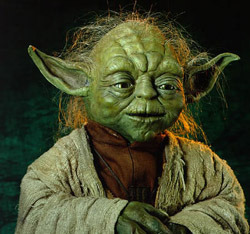 It's important to me that statistics are as accurate as possible. After all, 76% of statistics are made up on the spot, including that one. But I'm a stats nerd, so when we have a census, we need it to be as close to truth as possible. With that in mind, I entreated my minions on Twitter to make sure they did the right thing on census night. If you have no religion, I told them from a lectern of self-recognised authority, make sure you put No Religion. Don't mess up the stats by putting something stupid like Jedi or Pastafarian (bless His Noodly Appendage). I was very quickly corrected by a number of minions. It doesn't matter, they said, because putting Jedi would automatically get counted as No Religion anyway. I was outraged. What about the actual practicing Jedi out there? Suddenly their voice is not being heard.
It's important to me that statistics are as accurate as possible. After all, 76% of statistics are made up on the spot, including that one. But I'm a stats nerd, so when we have a census, we need it to be as close to truth as possible. With that in mind, I entreated my minions on Twitter to make sure they did the right thing on census night. If you have no religion, I told them from a lectern of self-recognised authority, make sure you put No Religion. Don't mess up the stats by putting something stupid like Jedi or Pastafarian (bless His Noodly Appendage). I was very quickly corrected by a number of minions. It doesn't matter, they said, because putting Jedi would automatically get counted as No Religion anyway. I was outraged. What about the actual practicing Jedi out there? Suddenly their voice is not being heard.
Apparently the reason for this is because Jedi or Jediism (and who doesn't love a word with a double i?) has not been legally decreed as an official religion. This pisses me off. Who are the Australian government, or anyone else for that matter, to tell us what our religion can be? In the 2001 New Zealand census there were more Jedi than Buddhists or Hindus. Of course, most of those 1.5% of respondents were being smartarses, but a small number may well associate very personally with Jediism. And good for them.
The biggest "officially recognised" religion in Australia is based on "the belief that a cosmic Jewish zombie who was his own father can make you live forever if you symbolically eat his flesh and telepathically tell him you accept him as your master, so he can remove an evil force from your soul that is present in humanity because a rib-woman was convinced by a talking snake to eat from a magical tree." That's the definition of Christianity from the Urban Dictionary and it's pretty bloody bang on.
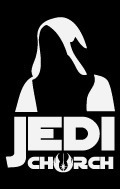 The NZ based Jedi Church states: "The Jedi Church believes that there is one all powerful force that binds all things in the universe together. The Jedi religion is something innate inside everyone of us, the Jedi Church believes that our sense of morality is innate. So quiet your mind and listen to the force within you!"
The NZ based Jedi Church states: "The Jedi Church believes that there is one all powerful force that binds all things in the universe together. The Jedi religion is something innate inside everyone of us, the Jedi Church believes that our sense of morality is innate. So quiet your mind and listen to the force within you!"
Screw the "official recognition", I know which one of those makes more sense to me. And which one is likely to be the cause of far fewer wars, oppression and suffering.
I don't follow any religion. On the census I put No Religion to make sure the stats were accurate from my input. But the stats are way off because the things people choose to believe in aren't recognised. If someone can be counted for believing in a self-fathering Jewish zombie, someone else should be counted for believing in the Force. If someone puts Jedi and gets counted as No Religion, there's a problem. Imagine putting Catholic or Muslim and getting counted as No Religion. It's the same thing. And the belief of Jediism is no less reasonable than Catholicism or Islam. Just because they've been around since medieval times doesn't make them somehow more valid. It makes them medieval. And we've all seen where that leads us.
So not only did the Australian Bureau of Statistics give me no place note down my dog on the census form, even though he's a very important member of my family, or let me note that I ride a motorcycle, stating that only cars count for some reason, they're also telling me what I can believe. It's one thing to recognise a religion for legal purposes. As far as I'm concerned all organised religions should be declared businesses and pay tax as such. Tax exemption for believing in an imaginary friend is really only something that should apply to pocket money for children. But legality aside, if I choose to believe in something, that's entirely my choice. If the ABS want a true snapshot of the nation, they should accept all belief systems, not just a handful they think are worthy through some arbitrary decision. If they want to include religion on the census they need to make a proper job of it.
.
August 12, 2011
NPR Top 100 Science-Fiction & Fantasy Books
This is an interesting list. I saw it retweeted by Neil Gaiman on Twitter, and his words were wise: "Don't worry about the numbers, just read the books." I couldn't agree more.
More than 60,000 ballots were cast in the NPR annual summer reader's survey. Below is a list of the top 100 winners. How many have you read?
1. The Lord Of The Rings Trilogy, by J.R.R. Tolkien
2. The Hitchhiker's Guide To The Galaxy, by Douglas Adams
3. Ender's Game, by Orson Scott Card
4. The Dune Chronicles, by Frank Herbert
5. A Song Of Ice And Fire Series, by George R. R. Martin
6. 1984, by George Orwell
7. Fahrenheit 451, by Ray Bradbury
8. The Foundation Trilogy, by Isaac Asimov
9. Brave New World, by Aldous Huxley
10. American Gods, by Neil Gaiman
11. The Princess Bride, by William Goldman
12. The Wheel Of Time Series, by Robert Jordan
13. Animal Farm, by George Orwell
14. Neuromancer, by William Gibson
15. Watchmen, by Alan Moore
16. I, Robot, by Isaac Asimov
17. Stranger In A Strange Land, by Robert Heinlein
18. The Kingkiller Chronicles, by Patrick Rothfuss
19. Slaughterhouse-Five, by Kurt Vonnegut
20. Frankenstein, by Mary Shelley
21. Do Androids Dream Of Electric Sheep?, by Philip K. Dick
22. The Handmaid's Tale, by Margaret Atwood
23. The Dark Tower Series, by Stephen King
24. 2001: A Space Odyssey, by Arthur C. Clarke
25. The Stand, by Stephen King
26. Snow Crash, by Neal Stephenson
27. The Martian Chronicles, by Ray Bradbury
28. Cat's Cradle, by Kurt Vonnegut
29. The Sandman Series, by Neil Gaiman
30. A Clockwork Orange, by Anthony Burgess
31. Starship Troopers, by Robert Heinlein
32. Watership Down, by Richard Adams
33. Dragonflight, by Anne McCaffrey
34. The Moon Is A Harsh Mistress, by Robert Heinlein
35. A Canticle For Leibowitz, by Walter M. Miller
36. The Time Machine, by H.G. Wells
37. 20,000 Leagues Under The Sea, by Jules Verne
38. Flowers For Algernon, by Daniel Keys
39. The War Of The Worlds, by H.G. Wells
40. The Chronicles Of Amber, by Roger Zelazny
41. The Belgariad, by David Eddings
42. The Mists Of Avalon, by Marion Zimmer Bradley
43. The Mistborn Series, by Brandon Sanderson
44. Ringworld, by Larry Niven
45. The Left Hand Of Darkness, by Ursula K. LeGuin
46. The Silmarillion, by J.R.R. Tolkien
47. The Once And Future King, by T.H. White
48. Neverwhere, by Neil Gaiman
49. Childhood's End, by Arthur C. Clarke
50. Contact, by Carl Sagan
51. The Hyperion Cantos, by Dan Simmons
52. Stardust, by Neil Gaiman
53. Cryptonomicon, by Neal Stephenson
54. World War Z, by Max Brooks
55. The Last Unicorn, by Peter S. Beagle
56. The Forever War, by Joe Haldeman
57. Small Gods, by Terry Pratchett
58. The Chronicles Of Thomas Covenant, The Unbeliever, by Stephen R. Donaldson
59. The Vorkosigan Saga, by Lois McMaster Bujold
60. Going Postal, by Terry Pratchett
61. The Mote In God's Eye, by Larry Niven & Jerry Pournelle
62. The Sword Of Truth, by Terry Goodkind
63. The Road, by Cormac McCarthy
64. Jonathan Strange & Mr Norrell, by Susanna Clarke
65. I Am Legend, by Richard Matheson
66. The Riftwar Saga, by Raymond E. Feist
67. The Shannara Trilogy, by Terry Brooks
68. The Conan The Barbarian Series, by R.E. Howard
69. The Farseer Trilogy, by Robin Hobb
70. The Time Traveler's Wife, by Audrey Niffenegger
71. The Way Of Kings, by Brandon Sanderson
72. A Journey To The Center Of The Earth, by Jules Verne
73. The Legend Of Drizzt Series, by R.A. Salvatore
74. Old Man's War, by John Scalzi
75. The Diamond Age, by Neil Stephenson
76. Rendezvous With Rama, by Arthur C. Clarke
77. The Kushiel's Legacy Series, by Jacqueline Carey
78. The Dispossessed, by Ursula K. LeGuin
79. Something Wicked This Way Comes, by Ray Bradbury
80. Wicked, by Gregory Maguire
81. The Malazan Book Of The Fallen Series, by Steven Erikson
82. The Eyre Affair, by Jasper Fforde
83. The Culture Series, by Iain M. Banks
84. The Crystal Cave, by Mary Stewart
85. Anathem, by Neal Stephenson
86. The Codex Alera Series, by Jim Butcher
87. The Book Of The New Sun, by Gene Wolfe
88. The Thrawn Trilogy, by Timothy Zahn
89. The Outlander Series, by Diana Gabaldan
90. The Elric Saga, by Michael Moorcock
91. The Illustrated Man, by Ray Bradbury
92. Sunshine, by Robin McKinley
93. A Fire Upon The Deep, by Vernor Vinge
94. The Caves Of Steel, by Isaac Asimov
95. The Mars Trilogy, by Kim Stanley Robinson
96. Lucifer's Hammer, by Larry Niven & Jerry Pournelle
97. Doomsday Book, by Connie Willis
98. Perdido Street Station, by China Mieville
99. The Xanth Series, by Piers Anthony
100. The Space Trilogy, by C.S. Lewis
.
August 10, 2011
Guest post – Martin Lastrapes and Creating the Illusion of Flesh and Blood
It's been a while since I had a guest post here. Today I'm happy to host Martin Lastrapes as part of the blog tour for his debut novel, Inside The Outside. Martin's book covers a very confronting subject and his post today is a reflection of a part of that issue. He talks about character development and how to make us care about characters. Very important if your characters are hard to like! So, take it away Martin.
 Creating the Illusion of Flesh and Blood on the Page
Creating the Illusion of Flesh and Blood on the Page
At the center of my debut novel, Inside the Outside, is a 15-year-old cannibal named Timber Marlow. Aside from being a cannibal, Timber is also something of a killer. But despite her penchant for eating flesh and occasionally taking lives, she is the hero of my story, which means I need for the reader to both like her and sympathize with her. So, how do you get the reader to care about a character who has done terrible, gruesome things? It's not quite as complicated as you might think.
Any story worth telling has a character worth caring about. If you create a dramatic scene without properly developing your character(s), then your reader won't care. It doesn't matter how big the explosion or how bloody the body count, if you've not properly developed your character(s), then there is nothing at stake. Nothing to be lost or gained.
Consider any news broadcast you've ever seen. Invariably, there'll be some tragic event being reported—a murder, a bus crash, etc. If the news broadcast simply says, "Something bad happened today and two people died," you may very well think it's a terrible thing, but you don't really care (not if you're being honest with yourself) because you don't know who died. You're not invested, yet. Suppose, then, you learn that the two people who died were a mother and her child. Then suppose you learned that the mother was in her mid-twenties and the child had recently learned to walk. Now, before you've even learned their names, you care a lot more about their deaths. You know things about them, you're invested in their stories.
Of course, when you write fiction, you're not dealing with real people, which means you must create the illusion of flesh and blood. While it's important to have an engaging plot, your reader will have a difficult—if not impossible—time engaging in it if it's not inhabited by a character (or characters) they care about. But, if you can successfully create the illusion of flesh and blood, your reader will read every page—every word!—of your story, because they'll need to know what's going to happen next, they need to know how your character's journey ends.
How do you develop a character?
First of all, the physical description of your character generally doesn't bare any consequence with regards to how real they are. Now, this doesn't mean the physical description isn't important; you definitely want to give your reader at least some idea of what your character looks like. However, don't overestimate its importance. Unless the physical nature of your character carries some weight or influence on the overall story being told—such as a war veteran who's lost a limb or a fantasy character with unique physical attributes, such as a Minotaur—it's best to keep physical descriptions to a minimum.
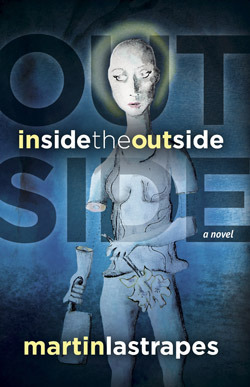 More important than the physical descriptions is the nature of your character. The reader doesn't care about your character based on how they look, but rather who they are. One of the best ways to illustrate your character's nature is to show the reader what types of choices they make. And you want to dramatize your character's choices so the reader can feel the weight of them.
More important than the physical descriptions is the nature of your character. The reader doesn't care about your character based on how they look, but rather who they are. One of the best ways to illustrate your character's nature is to show the reader what types of choices they make. And you want to dramatize your character's choices so the reader can feel the weight of them.
Let's say, for example, your character is walking down the street and they come across a bag filled with money. While there are many possible choices to make, the first and most immediate choice is this: Do they pick the money up or do they leave it on the street? The moment your character makes that choice, your reader has learned a lot about them.
Let's say, then, that your character picks the money up. Now there is another choice to make: Do they spend the money or do they take it to the authorities? Again, this choice tells us even more about your character.
And, finally, let's say, your character spends the money: Do they buy themselves frivolous gifts or do they use it to pay for something important, like a life-saving operation for their child? As you can see, the more choices your character makes, the more real they become. And the more real they become, the more the reader will care about them.
In the end, every character you will ever create will ultimately be some version of you. Even if you weave a character out of thin air, they must first be filtered through your imagination. You mold your characters as from clay and, in so doing, your fingerprints will be left all over them. Now, this doesn't mean that your characters have to feel the way you do or make all the same choices you would make.
Even if your character is doing something that you would never do—like robbing a bank or running a marathon, for instance—the choices they make are filtered through your imagination. So while you may never have robbed a bank yourself, if this a choice your character makes, you must imagine how they would do it—which means that, really, you must imagine how you would do it.
Let me leave you with a simple writing exercise:
Think about someone you know very well (i.e. a parent, a best friend, a lover, etc.) and picture them in your mind. There are hundreds of details that make up that image in your mind, so imagine that, in order to describe them in prose, you were only allowed to select three details. What would they be?
Their height? The color of their hair? The size of their feet? The way their breath smells after a nap? The way their toes crack when they walk down the hall? Selecting only three forces you to focus on the most important traits. The same is true for your characters.
So, next time you begin to develop a character, try this:
• Select three physical traits—as in, three details that can be experienced by any one of the five senses.
• Select three abstract traits—as in three details that cannot be experienced by any one of the five senses.
• Select three things that make them happy.
• Select three things they are afraid of.
• Select three choices made that they are deeply ashamed of.
• Select three personal victories that changed their life.
And as you make notes of these traits, what you are essentially doing is building your character. So once you get back to your story—be it a novel or flash fiction or anything between—you can feel confident that your reader will care about your character, because you've taken the necessary steps towards making them real, creating the illusion of flesh and blood.
.
MARTIN LASTRAPES grew up in the Inland Empire. He studied at Cal State San Bernardino, where he earned a Bachelor's Degree in English and a Master's Degree in Composition. Inside the Outside is his first novel.
Inside Martin (Official Author Website): www.martinlastrapes.com
Facebook Fan Page: http://www.facebook.com/pages/Martin-Lastrapes/211321185585755
GoodReads Author Page: http://www.goodreads.com/author/show/5041733.Martin_Lastrapes
.
August 9, 2011
The formula for success and life in the way
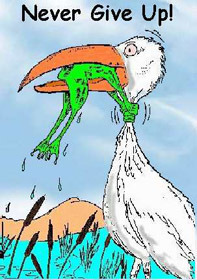 My apologies for things being a bit quiet on this front lately. I've been overwhelmed by general life things when I'd much rather have the time to post here and write more. But that's ever the way. The life of the writer is a combination of rejection, poverty and distraction, in varying quantities. But we soldier on, burdened as we are with the un-fucking-shakeable need to tell stories. Because every once in a while we reap the rewards.
My apologies for things being a bit quiet on this front lately. I've been overwhelmed by general life things when I'd much rather have the time to post here and write more. But that's ever the way. The life of the writer is a combination of rejection, poverty and distraction, in varying quantities. But we soldier on, burdened as we are with the un-fucking-shakeable need to tell stories. Because every once in a while we reap the rewards.
It's all justified when we get that acceptance letter from a publisher, that incredible high when someone with no bias, no knife pressed against their fragile carotid artery, actually wants to buy something we've written. There really is no feeling like it and we all dream of the day when that kind of acceptance is enough to pay the bills and put food on the table. It doesn't happen for many, but it does happen. And we're all bloody-minded sons(and daughters)-of-bitches, refusing to give up on the dream. I firmly believe that equally important with talent is determination.
The successful people in the world are the ones who never give up. They have the dreams, but everyone has those. They have the talent, but anyone can learn that. Of course, there will always be those people with a natural gift. They're the writers other successful writers envy. Some people are just too damned talented for their own good, but anyone can get good. With practice, with a desire to learn and a determination to succeed, people get talented. But the really successful people also have that old donkey stubborness. That "fuck you if you think I'll quit" attitude. Dreams, talent and determination – that's almost the formula for success. Almost.
You need to liberally add the essential spices of help from friends and luck. None of us get anywhere without those things too. It's all very well to say that you only have to believe hard enough and anyone can reach their dreams. That's bollocks. You need luck. But I'm also a fan of that other great proverb: The harder I work, the luckier I get.
Dreams, talent, determination, friends and luck. Put all that in a cauldron and stir it up with a heady stew of hard fucking work. That's all there is to it.
But life does get in the way. During the process, other shit happens. You all know life, you're living it with me. Shit's hard, people die, nothing is fair. That's life in a nutshell. It needs to be dealt with, decisions have to be made, money needs to be earned to pay bills and buy groceries. We're often distracted from the real stuff by life. Because life isn't the real stuff – it's the essential stuff. The unavoidable, no choice stuff. The real is the dream. Make your dreams real, remember that? What's it all for, the struggle to survive, if you're not chasing something? Whatever it is you feel the burning need to do, whatever moves you like writing moves me, has to be the real thing for you. The thing you're living for. The rest is existence. The dreams are living.
So life gets in the way. I've been a bit burdened by it myself lately. But will I give in? Hell, no. Old donkey stubborn, that's me. Still working hard. So if things go a bit quiet around here from time to time, don't worry about it. I'm too determined to quit.
The Formula:
Dreams, Talent, Determination, Friends, Luck
____________________________________
Hard Fucking Work
Never give up. Go on, you can do it!
.
August 3, 2011
Books in the post and publishers doing it right
I posted yesterday about royalty-only anthologies and the issues I have with them. Interestingly, today I checked my P O Box and had a parcel. Inside were two books.
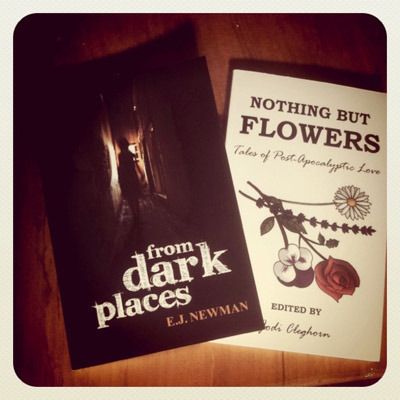
These are copies of two of the books from emerging publishing powerhouse Jodi Cleghorn. One is the charity anthology Nothing But Flowers, which is a speculative fiction anthology raising funds for the Grantham Flood Support Fund. The other is the debut collection from new voice in dark fiction, Emma Newman, called From Dark Places. Jodi asked me to read and blurb this collection, which I was more than happy to do. Newman writes excellent short fiction and I'm pleased to have my endorsement on the back cover.
After my ranting yesterday about publishers doing it wrong, Jodi is an example of someone doing it right. She asked me to help with the book, I was happy to do so and she sent me a copy for my trouble. That's looking after people and creating an environment where creatives will be quite prepared to help out again and promote the good stuff. Which is exactly what I'm doing here. Jodi's also a writer, so she gets it. The work she publishes is well worth your time and money.
You can get your own ebook or print copy of Nothing But Flowers here.
Get your ebook or print copy of From Dark Places here. This really is a quality collection of dark short stories. I reviewed it here on its initial release, if you're interested to learn more.
Way to go, Jodi. Keep up the good work.
.



